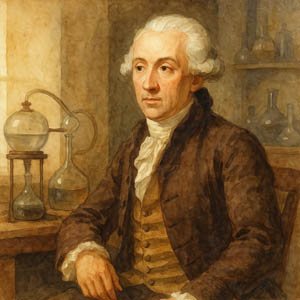— Antoine-Laurent Lavoisier
 Considered the founder of modern chemistry, Antoine-Laurent Lavoisier (1743–1794) was born on this day in Paris, France. He named 33 elements and forever changed how we understand oxygen, combustion, and the very building blocks of matter.
Considered the founder of modern chemistry, Antoine-Laurent Lavoisier (1743–1794) was born on this day in Paris, France. He named 33 elements and forever changed how we understand oxygen, combustion, and the very building blocks of matter.
“The art of reasoning is nothing more than a language well arranged,” he wrote in his trailblazing work, Elements of Chemistry.
With precision and passion, Lavoisier pioneered the first truly quantitative chemical experiments. He named hydrogen. He named oxygen. He defined water. His unwavering dedication to truth elevated science to an art—and every experiment, a step toward clarity. He gave his work to the world, for the public good.
Albert Einstein once said, “The ideals that have lighted my way and time after time have given me new courage to face life cheerfully, have been kindness, beauty, and truth.” Lavoisier lived those ideals through chemistry, giving shape to the invisible and meaning to the measurable.
Respected by scholars across Europe, he was elected to the French Academy of Sciences at age 25. In 1790, he helped establish the metric system—a revolution of logic and fairness in measurement. His chemical naming system remains a global standard. His legacy, still burning bright.
Yet even reason could not protect him. As a member of the Ferme générale, France’s tax agency, he sought reform. But during the French Revolution, he was arrested and executed. Mathematician Joseph-Louis Lagrange mourned: “It took them only an instant to cut off that head, and a hundred years may not produce another like it.”
Lavoisier’s flame endures... in every reaction, every rule, every moment we dare to test the truth and draw new conclusions from what we observe.
 Look before you jump to conclusions.✨💡
Look before you jump to conclusions.✨💡
